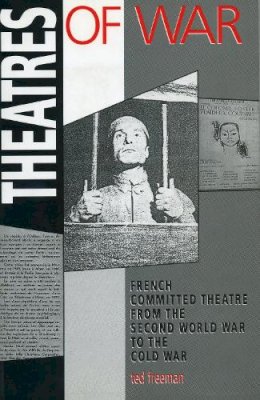Ted Freeman is Senior Lecturer in French, University of Bristol. He is the author and editor of many books.
“But some literary works . . . Acquire, as the years go by, a 'petite madeleine' quality that brings back, especially to those fortunate to have tasted them when they came out, the whole atmosphere of the period in which they were first produced. This is particularly true of several of the fifteen plays studied in this well-researched and impeccably documented book. . . Freeman brings the atmosphere of the late 1940s and early 1950s so compellingly back to life that I felt at times as though I was reading a particularly good historical novel." (MLR, Vol. 94, No. 3, 1999) "Weaving together theatrical, social and political history in a readable and informative way, Theatres of War is a useful guide to a neglected area of postwar French theatre history." (Speech and Drama, Vol. 48, No. 2, Autumn 1999) "Not only is this study a timely re-appraisal of French committed theatre at a crucial point in France's history (1942-54) from various political stances, it opens up the question of the didactic or realist nature of littérature engagée more widely. . . A thought-provoking and searching challenge to new and old devotees of French committed theatre and twentieth-century theatre more widely." (Forum for Modern Language Studies, Vol. 35, No. 4, 1999) "Freeman's introduction succinctly places these dramas into their political and theatrical contexts and his concluding chapter offers a neat survey of the common characteristics shared by the plays of this genre, but it is primarily as a source book that his study will serve a purpose. The bulk of the study is documentation, rather than analysis, and as such it will be a useful addition to relevant reading lists. Its appearance will be of interest to scholars and students not only of Modern French Theatre, but of political theatre in general, and of the popular manifestation of political concerns, not to mention to those with specific interests in the dramatic worlds of Sartre and Camus . . . Each play is contextualised in terms of the particular event it was documenting or written in response to, or the political climate it sought to exploit, and each has a chapter dedicated to it that might easily be read in isolation from the rest of the book." (Studies in Theatre Production, Issue 18, December 1998) “Freeman’s lucid and detailed historical analysis focuses on plays which are often neglected by literary or theatre historians, since they marked no advance in the art of drama. His criterion for inclusion is rather that they should have been seen at the time as important because of their subject matter. This approach requires a commentary that can sum up complex social issues and can show how the plays in question affected or responded to the political climate of their time. Freeman meets that interdisciplinary challenge and vindicates his claim that the plays merit fresh consideration. His climax is an important ‘find’: Drame à Toulon - Henri Martin, the one play of the period which really fulfilled the dreams of the Théâtre Populaire pioneers, being performed to huge popular acclaim in worker’s halls all over France and provoking a prise de conscience by the French working class concerning their role in colonial wars. In this book, Freeman convincingly brings to life a lost age, when the theatre still provided a debating forum for matters of national importance.” (French Studies Review, Vol. LIV, No. 2, 2000)

